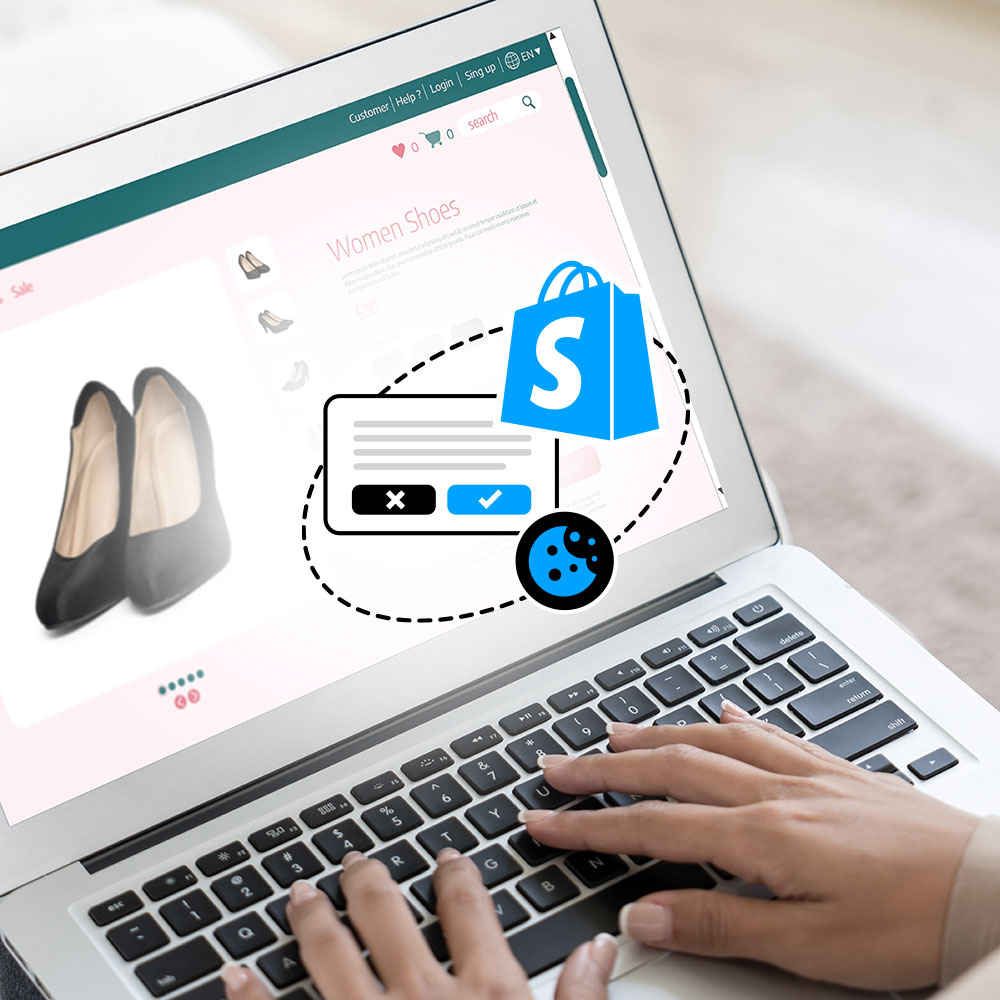Ecommerce sites collect a lot of personal data from visitors and customers. The data enables them to process orders, improve user experience on the site, and develop ad strategy, among other uses.
Read about eCommerce consent requirements now
Collecting this data means that Shopify website owners have to comply with the requirements of relevant global data privacy laws. These requirements can include informing customers about data collection and use, obtaining consent for various uses of their data, and other functions.
Good Shopify consent management strategy doesn’t just enable data privacy compliance and protect your business from fines and other legal penalties, however. When users get great user experience, clear information, and user-friendly choices, it builds trust.
Earning people’s trust helps turn casual browsers into customers and increases their engagement with your brand over time. That results in even more of the data you need for marketing activities, as well as boosting your bottom line.
In this article, we’ll look at why your Shopify site needs a cookie banner, and how to set one up to support customer-friendly Privacy-Led Marketing and Shopify cookie consent.
Why your Shopify website needs a cookie banner
Before moving into the implementation process, let’s examine why having a Shopify cookie banner on your site is so important for your business.
Maintain your campaigns on Google services
Google Ads campaigns are important to many Shopify site owners for traffic, so continuing to meet Google’s evolving privacy requirements is critical. Implementing a compliant cookie banner enables you to maintain full access to important features in Google services, like personalization and remarketing in Google Ads.
Usercentrics CMP is Google-certified and comes with Google Consent Mode v2 ready to go. The two solutions together enable you to obtain compliant consent information from your users and signal it via Consent Mode to Google services, which Google requires to maintain full access to their platforms. That consent information then controls the firing of tags for ads, analytics, and other services so personal data is only collected where and when your users have consented to it.
With Advanced Consent Mode, you can gain insights into the user journey with conversion modeling and other tools, even without explicit user consent. Usercentrics CMP and Consent Mode are critical to continuing successful marketing campaigns, but also your competitive advantage.
Use Privacy-Led Marketing to demonstrate your organization’s commitment to privacy
Headlines about data breaches and other regulatory violations continue, but day to day marketers have a job to do, so your focus is on getting people’s attention, making sales, analyzing data, and improving strategies.
A Shopify consent banner can be an important tool to enable your company’s continued access to third-party services, like analytics or advertising, that increasingly require proof of consent. Displaying a consent banner also prominently shows your commitment to respecting your customers’ privacy and putting them in control of their interactions with you.
People do more business with companies they trust, so providing clear information about data use and consent options via your Shopify cookie banner builds trust so customers keep coming back to your site. That’s good for your bottom line, and for collecting valuable marketing data over time.
Stay compliant with privacy regulations and avoid penalties
The requirements of data privacy regulations are becoming the norm when doing business, and these laws are evolving in conjunction with related frameworks, policies, and business requirements. While the headlines focus on huge tech companies and the sky-high fines levied on them, data protection authorities do enforce laws like the General Data Protection Regulation (GDPR) and ePrivacy Directive in the European Union and the California Consumer Privacy Act (CCPA) in the United States with companies of all sizes.
While consent requirements may differ among privacy laws, all of them require that individuals be notified about data use and their privacy rights. Failing to provide clear information to customers, or obtain valid Shopify cookie consent for access to their data, can result in fines and other penalties, including suspension of marketing activities and audits, which can make some business operations unsustainable.
The loss of brand reputation and customer trust can be a serious blow to your bottom line, too. Not only will prospective customers take their business elsewhere, existing customers likely also will. A history of privacy violations doesn’t look good to advertisers, potential business partners, or investors, either.
Implementing a user-friendly and well-branded cookie banner not only helps protect your business, but helps build a sustainable foundation for growth with your Shopify site.
Steps to add a cookie banner to your Shopify website
We know you have a lot to do. Fortunately, you can integrate your cookie consent banner with your Shopify account in a few simple steps. Usercentrics CMP easily integrates with Shopify landing pages and other pages on your site.
1. Sign up for your Usercentrics account
Click on the START FREE button at the top right of the Usercentrics website. Click the Usercentrics Web CMP tab and you can sign up for your 14-day free trial at the next step.

2. Configuring your banner in the Usercentrics Admin Interface
Once you have set up your account or logged in, you will set up your configuration. Click on Configuration in the Admin Interface. This includes adding the information about the domain —your Shopify site — where the banner will be displayed, language preference, etc. Learn more.
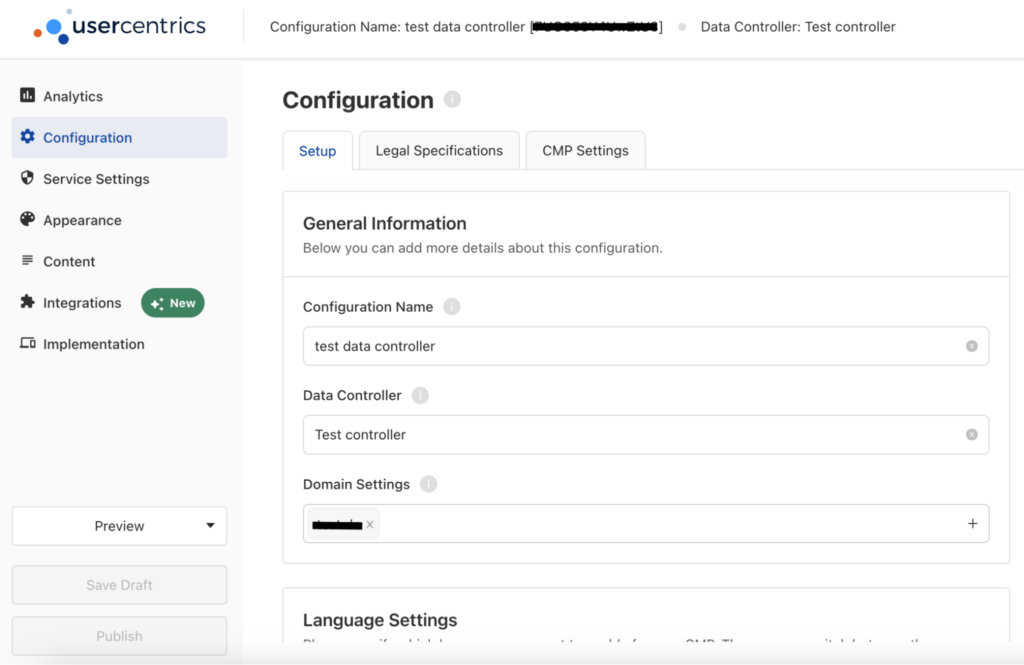
3. Initial website scan
Click on Service Settings in the Admin Interface to get started with the initial scan of your Shopify website to detect cookies and trackers in use, the Data Processing Services (DPS). Click the Initial Website Scan button.Once completed, it will generate your scan report under DPS Overview. Learn more.
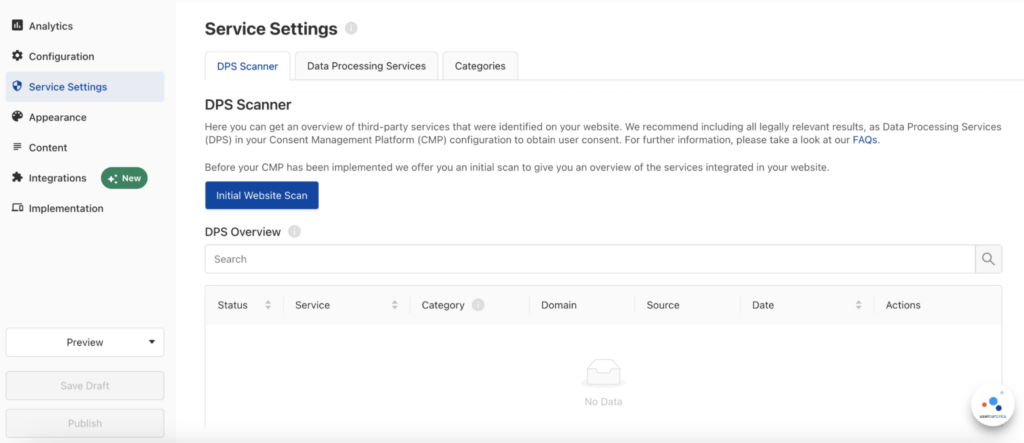
4. Categorizing Data Processing Services
The CMP will automatically categorize the DPS for you. Marketing, Functional, and Essential are included by default. However, if anything comes up as unclassified, or you want to manually edit the classifications, you can do that under Service Categories. You can use our predefined categories or define your own. Learn more.
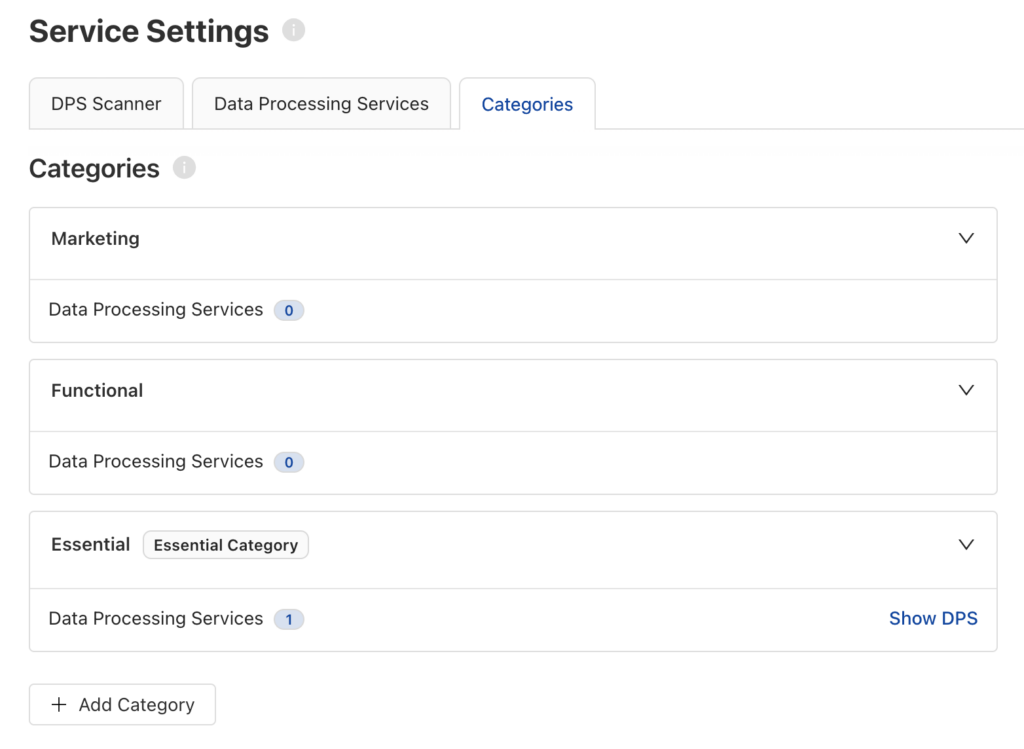
5. Add the Data Processing Services
Using the list from the initial scan report, add all the relevant cookies and tracking technologies for your website by clicking Add Service to the right of each DPS listing. These will be added to the CMP, and users will be able to access and control consent for them granularly by categories. This list of DPS will also be available for your Cookie Declaration. Learn more.
Note: Scripts for the DPS need to be adjusted to enable blocking until consent is obtained. Get information in our guide.
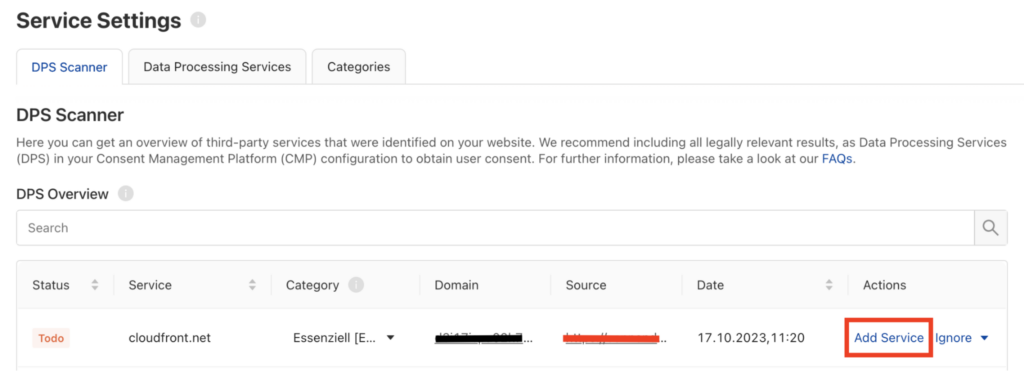
6. Customize banner appearance
Click Appearance to begin customizing your consent banner. Adjust the brand styling, logos, fonts, and more under the Styling tab. Under the Layout tab you can customize the first and second layer settings for the banner, as well as the Privacy Trigger, which is a shortcut that enables users who have already communicated their consent preferences to update their consent. Learn more.
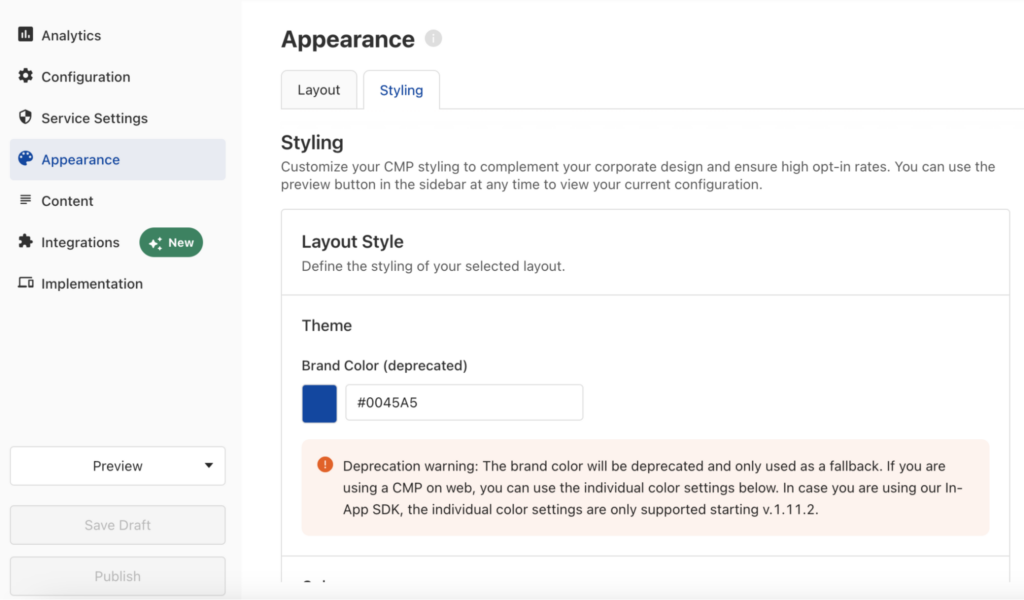
Click the Content tab, and there you can customize the text, links, and other elements to be displayed to users. Usercentrics CMP is available in 60 languages. Here you can also customize the information for relevant laws, e.g. the “Do Not Sell Or Share My Personal Information” link for the CCPA. Learn more.
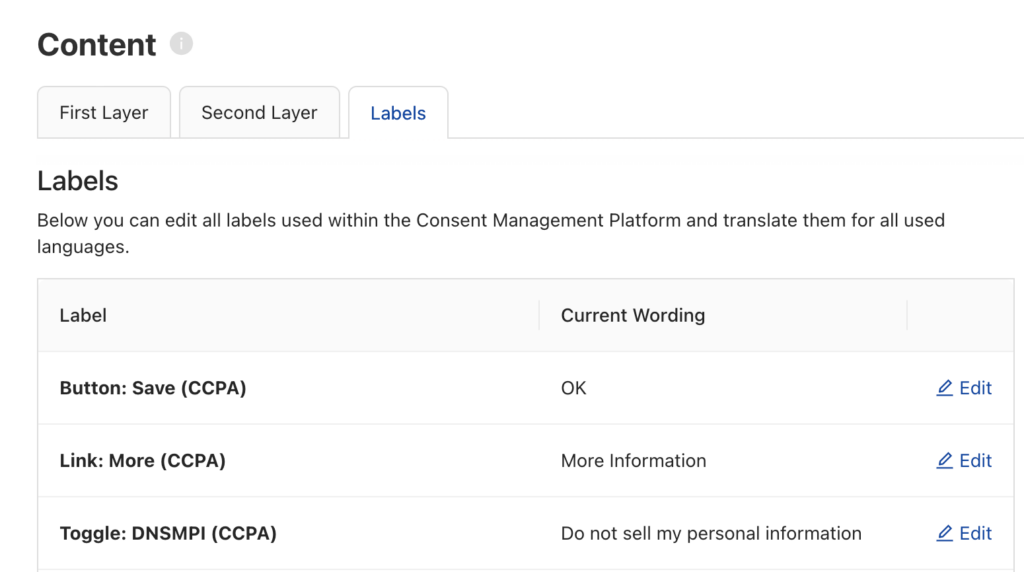
7. Implement the CMP on your Shopify website
Click the Implementation tab in the Admin Interface, and copy the CMP Script Tag. You will need to add that to your Shopify website.
Login to your Shopify account, and follow the steps in our Shopify Manual Implementation Guide to add the CMP Script Tag to your site and start collecting user consent.
The guide will also help you set up manual blocking for third-party services, such as Google Analytics, if needed.
8. Regularly monitor your cookie usage
The Usercentrics CMP runs a daily website scan and automatically sends the report to your inbox when it’s complete. We recommend regularly checking your scan report to make sure all the cookies and other tracking technologies in use on your site are correctly classified and have a purpose description. These often change over time, so it helps ensure that only the cookie categories that your customers have consented to are activated. It also updates your Cookie Declaration to accurately reflect your Shopify website’s cookie usage.
Achieve compliance for your Shopify website with the Usercentrics CMP
Usercentrics CMP makes it easy for you to inform your customers about your data processing and enable them to exercise their privacy rights — building trust with your brand. Our CMP is also an important Shopify consent management tool to help you achieve and maintain compliance with relevant global data privacy laws.
In just a few steps, set up a cookie banner that looks great, is user-friendly, and helps protect your business. Show customers that you respect their privacy and data.
We know you’re busy, so we’ve automated the process of scanning your Shopify website every month to help your cookie banner and cookie policy remain up to date. It saves you time and brings you peace of mind, enabling you to stay focused on growing your business.

